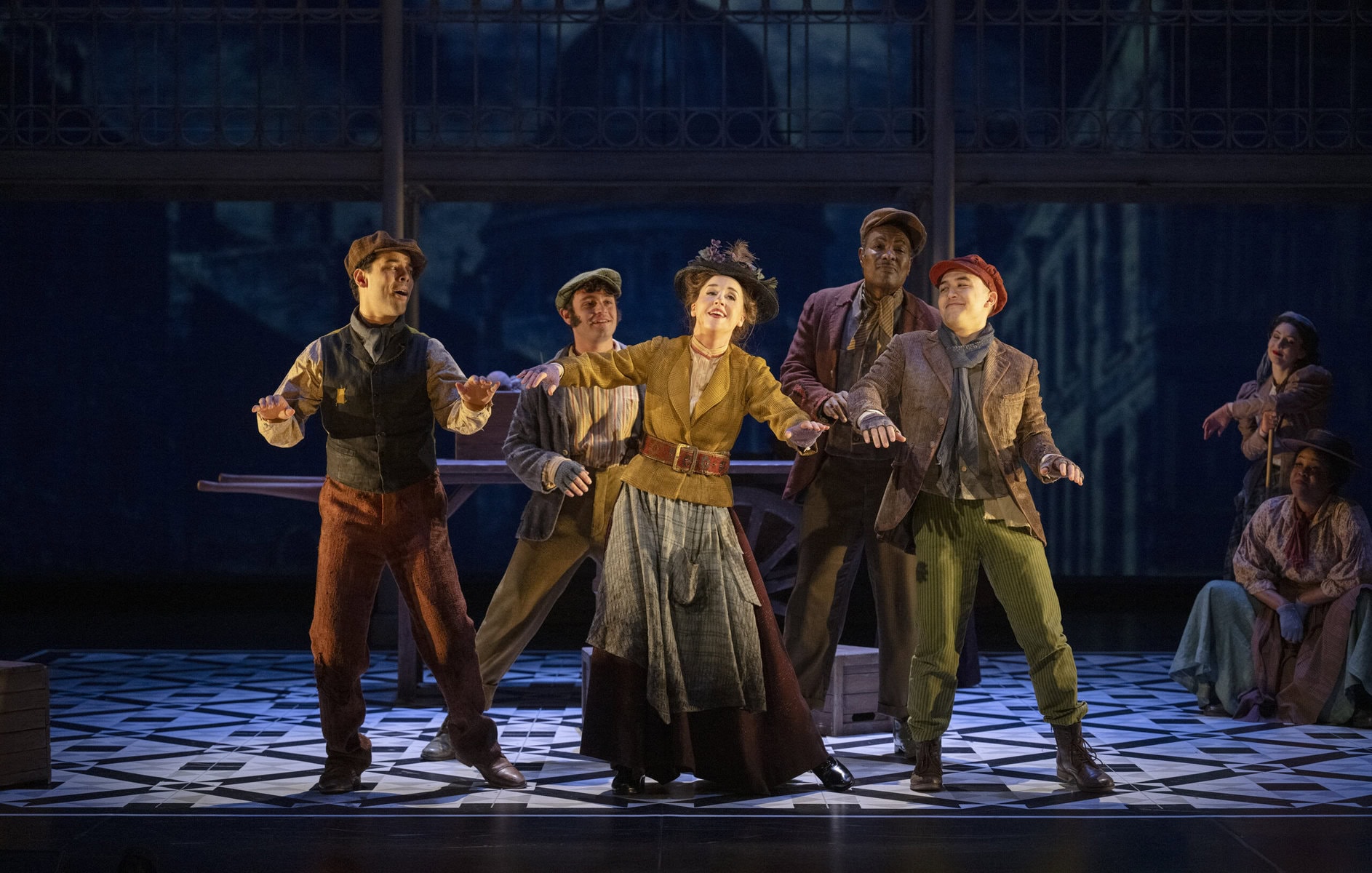MY FAIR LADY **** (out of 5)
At the Shaw Festival Theatre. Three hours, with one intermission. Co-directors: Tim Carroll, Kimberley Rampersad. Lyrics: Alan Jay Lerner. Music: Frederick Loewe. Adapted from George Bernard Shaw’s “Pygmalion.” On till Dec. 22.
Penny-Lynn Cookson
Special to The Lake Report
For the nay-sayers who lamented, “Please, not another ‘My Fair Lady,’ ” rest assured, the performances and presentation of this musical comedy are stellar, with a depth of social issues still relevant today.
The moment the curtain rose to the soaring music score played with strength and polish by the Shaw orchestra there was a palpable emotional reaction in the audience.
Lips moved to words well-known, audible hums murmured along. For many, it was the third and fourth time seeing “My Fair Lady” and they were back for more. They would not be disappointed.
On stage, the action begins with market sellers and toffs leaving the opera House seeking shelter from the rain in the portico of St. Paul’s Covent Garden.
Henry Higgins, a scholar of phonetics, is taking notes of the Cockney slang, yowls and mangled vowels of a flower seller, Eliza Doolittle.
A happenstance meeting with a fellow linguist leads to a bet that Higgins will, in six months, turn Eliza from a “guttersnipe” to a duchess speaking “proper English.” This will be a clash of two egos.
Kristi Frank triumphs as Eliza Doolittle in a strong, convincing performance of will, determination and sensitivity in her transition from the market to upper-class scrutiny at Ascot and the Embassy Ball.
It is pure pleasure to see Frank hold her own in voice and acting in a role so identified with Julie Andrews, Audrey Hepburn and Marni Nixon.
Tom Rooney, as Henry Higgins, is up against Rex Harrison’s famed petulant Higgins of stage and screen. He succeeds with a tighter, controlled and nuanced interpretation.
His criticisms of Eliza are no less whiplash stinging, misogynist, bullying and belittling, but out of his mama’s boy selfish entitlement, Rooney draws a dawning tenderness of need and understanding of self.
Sharry Flett is sublime as the refined, long-suffering mother of the indulged, exasperating, ill-mannered Higgins.
She loses her friends whenever he appears. Flett’s pacing, pauses and believability brought the greatest appreciative laughs from the audience.
David Adams as Eliza’s father is a dynamic, fast-talking Alfred P. Doolittle, who accepts and is happy with his lot in life as a dustman able to share a few pints with his friends.
He is not happy to be catapulted into money, morals and the middle class by an unexpected inheritance due to his gift of the Welsh gab.
As Freddy Eynsford-Hill, Taurian Teelucksingh has looks, voice and appeal as the besotted pursuer of Eliza. Will he succeed in winning her?
The role of Zoltan Karpathy, Hungarian translator and accent sleuth at European royal courts, is presented as a bushy-bearded buffoon rather than as a suave sophisticate.
He will be the one to determine if Eliza is a fraud. Unfortunately, we cannot understand his accent or his garbled words.
Crystal chandeliers and the glitter of gowns are the backdrop to the Ball scene. Eliza dazzles in a splendid chiffon-over-satin gown true to 1912 style.
Her trim, fitted skirt suit at Ascot echoes one worn by Rose in the film of the ill-fated Titanic. But where were the broad-brimmed hats with ostrich feathers expected at Ascot?
The contemporary sculptural hats were provoking but immediately recalled Princess Beatrice’s scandalously controversial Philip Treacy fascinator worn at the royal wedding in 2011. Intentional?
The exuberance, the charm, the delightful Cockney Quartet, all entertain.
But what lay beneath Shaw’s Pygmalion was his socialism and his recognition of the strongly held traditions in England of class hierarchy meant to exclude, rampant speech discrimination, economic inequality, male power vs. the rights of women and the consequences of gender and societal change from the Great War to his death in 1950.
These issues continue.
Will Eliza find love with Higgins or Freddy? She knows Higgins will not change. She will always be fetching the slippers.
She is grateful to him but it is Colonel Pickering, the counterfoil to Higgins, who has given her self-esteem, independence and strength because he has always treated her with kindness as a lady. Shaw was adamant who she would choose.
In the words of Alfred P. Doolittle, “I’m willing, I’m wanting and I’m waiting to tell you …” get yourself to this “My Fair Lady.”
Penny-Lynn Cookson is an arts and culture historian, writer and lecturer living in Niagara-on-the-Lake.









